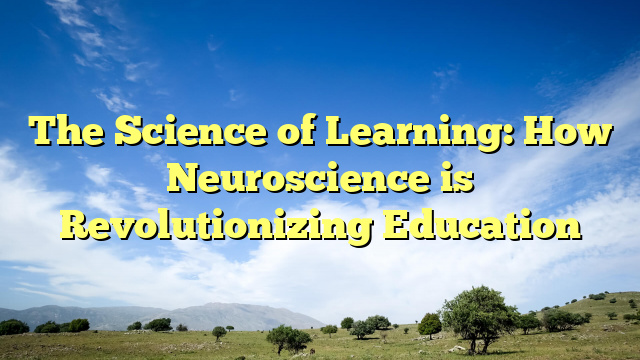Education has always been a crucial aspect of human development, but the way we approach learning and teaching has evolved over time. With advancements in neuroscience, we now have a deeper understanding of how the human brain learns and retains information. This knowledge has led to a revolution in education, as educators and policymakers are now incorporating neuroscience principles into teaching practices to enhance learning outcomes.
Neuroplasticity: The Brain's Ability to Change
One of the key concepts in neuroscience that has revolutionized education is neuroplasticity – the brain's ability to change and reorganize itself in response to learning and experience. This means that the brain is not a static organ, but rather a dynamic and adaptable system that can be shaped through intentional learning activities.
By understanding neuroplasticity, educators can design learning experiences that optimize brain function and promote long-term retention of information. This has led to the development of strategies such as spaced repetition, retrieval practice, and interleaved practice, which have been shown to enhance memory and learning efficiency.
The Role of Emotions in Learning
Another important aspect of neuroscience that has influenced education is the role of emotions in learning. Research has shown that emotions play a significant role in the learning process, as they can affect attention, motivation, and memory formation. By creating a positive and emotionally supportive learning environment, educators can help students engage more effectively with the material and retain information better.
Furthermore, understanding how emotions impact learning has led to the incorporation of mindfulness and emotional regulation practices in schools, which aim to help students manage stress and improve their overall well-being. These practices have been shown to not only enhance academic performance but also promote social and emotional development in students.
Personalization and Differentiation in Education
Neuroscience has also highlighted the importance of personalized and differentiated instruction in education. Every student has a unique brain and learning profile, and educators need to tailor their teaching strategies to meet the individual needs of each student. By incorporating personalized learning techniques, such as adaptive learning technologies and individualized learning plans, educators can create a more engaging and effective learning experience for students.
Furthermore, neuroscience has shown that learning is a social and collaborative process, and that peer interactions and group activities can enhance learning outcomes. By encouraging collaboration and social interaction in the classroom, educators can create a vibrant and stimulating learning environment that fosters creativity, critical thinking, and problem-solving skills.
Conclusion
Neuroscience is revolutionizing education by providing insights into how the brain learns and retains information. By understanding concepts such as neuroplasticity, the role of emotions in learning, and the importance of personalized and differentiated instruction, educators can design more effective teaching practices that enhance learning outcomes for all students. As we continue to unlock the mysteries of the brain, the future of education looks brighter than ever.
FAQs
What is neuroplasticity?
Neuroplasticity is the brain's ability to change and reorganize itself in response to learning and experience. This means that the brain is not a static organ, but rather a dynamic and adaptable system that can be shaped through intentional learning activities.
How can educators incorporate neuroscience principles into teaching practices?
Educators can incorporate neuroscience principles into teaching practices by designing learning experiences that optimize brain function and promote long-term retention of information. This can include strategies such as spaced repetition, retrieval practice, and interleaved practice.
Why is personalized and differentiated instruction important in education?
Personalized and differentiated instruction is important in education because every student has a unique brain and learning profile. By tailoring teaching strategies to meet the individual needs of each student, educators can create a more engaging and effective learning experience.
Unlock Your Mental Potential



